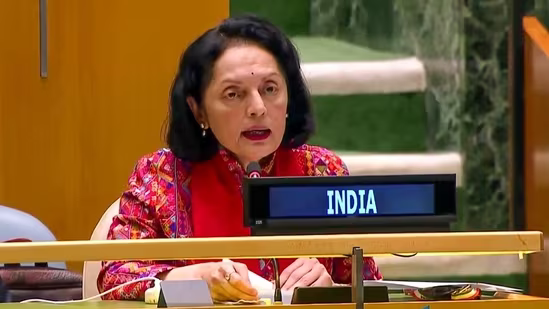India Votes in Favour of an Immediate Ceasefire in Gaza

Image Source: Hindustan Times
Breaking away from its earlier stand on the issue, India has voted in favour of a United Nations General Assembly (UNGA) resolution demanding an ‘immediate humanitarian ceasefire’ in the ongoing Israel-Hamas conflict. The resolution, titled “Protection of civilians and upholding legal and humanitarian obligations,” was adopted after 153 members voted in its favour, while 10 nations, including the US and Israel, voted against, and 23 chose to abstain. The development took place on Tuesday during an emergency special meeting of the UNGA on the Middle East.
In addition to an immediate ceasefire, the resolution has also demanded the ‘unconditional release of all hostages’ and ‘ensuring continued humanitarian access’ to the affected regions. Additionally, it has reiterated its demand that all parties comply with their obligations under international law, “notably with regard to the protection of civilians.”
The Israel-Hamas war began on October 7 this year when Hamas militants entered southern Israel, killed more than 1200 Israeli citizens, and took hundreds of others hostage. In retaliation, Israel has launched a devastating air and ground offensive in Gaza, which has, till now, resulted in the death of more than 18,000 Palestinians and has displaced close to 85% of the 2.3 million population of the besieged coastal enclave of Gaza.
This was the first time India supported such a resolution since the war broke out more than two months ago. It is important to note that there was no direct mention of Hamas in the text, and it also excluded any specific reference to the October 7 terror attacks in Israel by Hamas. Although an amendment to the draft resolution was proposed by the US mentioning the Hamas attack, it was dropped as it didn’t garner enough votes, even though India voted in its favour. In October, India had refused to vote in favour of a similar UNGA resolution calling for an ‘immediate humanitarian truce’ on the grounds that it had failed to condemn the October 7 attacks against Israel. Therefore, India’s latest decision reflects a change in its position on the global stage over the ongoing crisis in West Asia.
It must be noted that, unlike United Nations Security Council (UNSC) resolutions, resolutions of the General Assembly are not legally binding in nature and therefore cannot be enforced. Thus, it is unclear how such resolutions will bring about a change in the situation on the ground. However, they are important as they reflect the sentiments of the international community and help build pressure on the parties involved to resolve their differences.
Team Profile

- News Writer
- Anushka Pundir is a driven student currently pursuing her Masters in Business Administration (F&A) at Amity University. Anushka embarked on her academic journey with a Bachelor's degree in Political Science (Hons) from Delhi University, a testament to her diverse interests. Following her undergraduate studies, she dedicated herself to the rigorous preparation for UPSC and other government exams, showcasing her commitment to public service.
Latest entries
 English31 December 2023Russia’s President Putin Acknowledges Advancements in Bilateral Cooperation with India in New Year Greetings
English31 December 2023Russia’s President Putin Acknowledges Advancements in Bilateral Cooperation with India in New Year Greetings English30 December 2023India and Russia Strengthen Ties During EAM Jaishankar’s Visit, Discuss Nuclear Cooperation and Northern Sea Routes
English30 December 2023India and Russia Strengthen Ties During EAM Jaishankar’s Visit, Discuss Nuclear Cooperation and Northern Sea Routes News29 December 2023Qatar Commutes Death Sentence for Eight Former Indian Navy Officers; India Awaits Detailed Judgment
News29 December 2023Qatar Commutes Death Sentence for Eight Former Indian Navy Officers; India Awaits Detailed Judgment English28 December 2023Congress to Rally for Change, Targets BJP’s ‘Arrogant’ Government
English28 December 2023Congress to Rally for Change, Targets BJP’s ‘Arrogant’ Government









